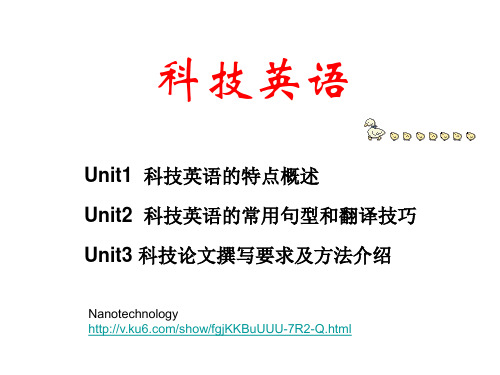科技英语词汇特点重点讲义资料
基础知识1

科技英语 基础知识
Part One
一、科技英语的特点 二、词汇 三、虚拟语气 四、翻译的技巧
一、科技英语的特点
1.1 复杂长句多 1.2 被动语态多 1.3 非谓语动词多 1.4 词性转换多 1.5 连接词
文体上:多用陈述句、祈使句 词语上:力求短小精悍,常用复合词 文章结构:层次分明,多用连接词 用词:技术性用词
要是原子核具有的中子数太少,就可能发生逆反应。
3.2 从句中
常见的动词: require, demand, suggest, desire, propose, recommend, request, necessitate, insist, order 常见的形容词: necessary, essential ,important, imperative, possible, impossible, desirable, natural, better, reasonable 常见的名词: requirement, suggestion, condition, constraint, restriction, demand, recommendation
科技英语语法特点

五、长句
为了表述一个复杂概念,使之逻辑严密,结构紧凑,科技文章中往 往出现许多长句。 有的长句多达七八个词,以下即是一例。
The efforts that have been made to explain optical phenomena by means of the hypothesis of a medium having the same physical character as an elastic solid body led, in the first instance, to the understanding of a concrete example of a medium which can transmit transverse vibrations ,and at a later stage to the definite conclusion that there is no luminiferous medium having the physical character assumed in the hypothesis. 为了解释光学现象,人们曾试图假定有一种具有与弹性固 体相同的物理性质的介质。 这种子尝试的结果,最初曾使人们了解到一种能传输横向振动 的具有上述假定所以认为的 那种物理性质的发光介质。
• (3)转化法(conversion):词形不转变、词性有所改 变 • Machine n.机床 v.加工 • alloy n.合金 v.使合金化 • (4)派生法:加前缀中缀后缀 合成新词 • 前缀-semi(半,不完全的)- semiconductor • Inter(在一起,交互) interchange • 中缀-s- sportsman • 后缀-logy(某学科)-biology,psychology • -meter(计,仪表)multimeter
科技英语词汇的翻译

• 常见科技词汇后缀:
-ness -tion -ity -ism
表示性质、状态 表示动作、状态 表示性质、状态 表示主义、学说
oneness, thoughtfulness, carelessness examination, realization, decoration reality, purity, gravity, formality atomism, criticism, socialism
在这种情况下,可能会损伤火箭发动机机体。
• He walks when he might take a taxi.
虽然他可坐出租车,却还是步行。
• The volcano has not been active for thousands of years. It is inactive.
这座火山有几千年没有爆发了,它是座死
• 翻译误区:科技英语翻译的难点是专业术语的翻
译,有一些词汇看起来很简单,但是在科技文章 中则产生了其他的含义。
英语 pig cock coat hand tooth
常见意义 猪
公鸡 外衣
手 牙齿
专业术语含义 金属锭块 吊车 镀层
手柄、指针 粗糙面
词义的引申
• 1. 技术性引申 使译文中涉及科学技术概念的词语符合技 术语言规范。
• BBS:Bulletin Board System 电子公告牌系统 • DNA:deoxyribonucleic acid 脱氧核糖核酸 • UFO:Unidentified Flying Object 不明飞行物 • VCD:Video Compact Disc 影音光盘(影碟) • AC:alternating current 交流电 • DC:direct current 直流电
科技英语的特点及翻译技巧

一、科技英语的特点
1、词汇特点
科技英语词汇具有专业性、精确性和简洁性。专业性指的是科技英语中大量使 用专业术语,这些术语通常具有明确的科学含义。精确性是指科技英语词汇的 选用力求准确,避免产生歧义。简洁性则是指科技英语倾向于使用复合词和缩 略词,以减少语言表达的冗余。
2、句法特点
科技英语句子结构通常较为复杂,多使用长句和被动语态。长句能够详细阐述 科学概念和原理,而被动语态则强调了客观性和准确性。此外,科技英语还经 常使用名词化结构(Noun Phrases)和定语从句(Adjective Clauses)等 语法结构,以增加信息的密度和清晰度。
科技英语的特点及翻译技巧
目录
01 一、科技英语的特点
03 参考内容
02
二、科技英语的翻译 技巧
随着全球化的加速和科技的发展,科技英语在当今社会中扮演着越来越重要的 角色。科技英语是一种专门用途英语(ESP),其特点主要表现在词汇、句法 和语境等方面。在翻译科技英语时,了解这些特点并掌握相应的翻译技巧是准 确传达信息的关键。
1、理解专业术语
科技文本中经常出现专业术语,因此理解这些术语是非常重要的。在翻译之前, 你应该了解相关的专业背景知识,以避免误解或误译。如果遇到不确定的术语, 可以查阅相关的专业词典或寻求专业人士强调客观事实。在翻译成中文时,应该尽量保 持这种被动语态的感觉,比如用“被”、“由”等词语来表达。同时,也应该 注意避免使用过多被动语态,以免使文本显得生硬不自然。
总之,科技英语的翻译需要结合其特点,灵活运用各种翻译技巧,以确保信息 的准确传递。通过不断提高自身的专业素养和语言能力,译者可以更好地服务 于读者,促进不同语言之间的科技交流与合作。
参考内容
科技英语翻译是一项重要的语言技能,它需要准确、客观、精练地表达原始信 息。由于科技文本的特殊性,如专业术语、长句、被动语态等,给翻译工作带 来了一定的挑战。以下是一些有用的技巧,可以帮助大家更好地进行科技英语 翻译:
科技英语

• 《Gone with wind》:
Home! I‘ll go home, and I‘ll think of some way to get him back. After all, tomorrow is another day.
• 《Titanic》:
Jack: Listen, Rose. You're going to get out of here. You're going to go on. You're going to make lots of babies, and you're going to watch them grow. You' re going to die and old, an old lady in her warm bed, not here, not this night, not like this. Do you understand me?
Word building(构词法)
• A common way of making new words in English is by adding standard combinations of letters to existing words, either at the beginning (prefixes) or at the end (suffixes).
- acryl-意为“丙稀”, -nitrile意为“腈”。通过词素语义 的分析“polyacrylonitrile”一词的汉意就弄清楚了,即“聚丙 烯腈”。
一些化合物的名称: methyltrichlorosilane 甲基三氯硅烷 聚四氟乙烯
polytetrafluoroethylene
3第六章 科技英语翻译

(3)大量使用概念准确的抽象名词 (Abstract Noun) ★
★
insulate-insulation expand-expansion move-movement leak-leakage stable-stability humid-humidity
绝缘 膨胀 运动 漏泄 稳定性 湿度
Back 2
the walls of the boiler [C;U] C: countable noun U: uncountable noun
耐火砖 可数名词 不可数名词 全封闭的 加工硬化 调频
通信卫星 BACK
10
full-enclosed work-harden fm Telesat (frequency modulation)
D.缩略法
4WD (four-wheel drive) 四轮驱动 CE (chief engineer) 总工程师 (Council of Europe) 欧洲理事会 FM (frequency modulation) 调频 TELESAT (telecommunications satellite ) 通信卫星 CCTV (closed circuit television) 闭路电视
7
★
动词派生的抽象名词可表示过程、现象、特征和性质
abort-abortion automate-automation commute-commutation lase-laser liase- liason televise-television soft-land-soft-landing install-installation protect-protection balance (v.& n.) guide- guidage
科技英语词汇特征及其翻译

精品文档
普通词汇
科技英语文献和普通英语在措词上有所不同。 科技作品中的普通词汇偏向于书面语,大词汇 和长词汇的出现频率远远高于普通英语。
精品文档
精品文档
专业词汇(technical words)
是指那些仅用于某个学科或某个专业的词汇或 术语,不同的专业和学科都有一系列含义精确 且相对狭窄的词汇。
精品文档
EL Nino Clone Multimedia Firewall Superconductivity bandwidth
精品文档
Velocity changes if either the speed or the direction changes.
精品文档
如果速率和方向有一个发生变化,则物 体的运动速度也随之发生变化。
精品文档
词类转换
汉英两种语言的表达方式千差万别,因此在翻 译过程中可以根据两种语言的特点适当改变原 文某些词的词类,以适应汉语的表达习惯或达 到一定的修辞目的。这种改变原文词类的译法 就叫词类转换。
科技英语词汇特征及其 翻译
精品文档
科技英语词汇的分类
科技英语的词汇一般包括专业词汇(technical words)、半专业词汇(sub/semi-technical words)和普通词汇。专业词汇的使用范围仅限 于某些专业;半专业词汇是由普通词汇转化而 来的,它除了本身的词义外,在不同学科中具有 不同的专业词义;在普通词汇的使用上,科技英 语和一般英语有不同。在科技文献中,专业词 汇的使用率远远低于半专业词汇和普通词汇。
科技英语的特点_0

6.借用法
许多科技名词和术语借用了专有名词, 科技英语词汇中借用的词有 人名,地名,商标名,外来语等。
例:借用人名:
物理学中的电力单位watt (瓦特)和电压单位volt (伏特) 分别源于 英国科学家James Watt(1736—1819)和意大利科学家Alexandro Volta(1745—1827)的姓氏。电流强度单位ampere(安培)源于法国科 学家Andre Marie Ampere(1775—1836)的姓氏,电阻单位ohm(欧 姆),电感单位henry(亨利), 电磁感应强度单位gauss(高斯)等等都 源于人名。
It is animals and plants which lived in or near water whose remains are most likely to be preserved, for one of the necessary conditions of preservation is quick burial, and it is only in the seas and rivers, and sometimes lakes, where mud and silt has been continuously deposited, that bodies and the like can be rapidly covered over and preserved.
例:
to make use of
利用
to give no evidence of 不足以说明
三、科技英语的句法特点
科技英语在句法上有着明显不同于一般英语的特点,主 要有以下几点:
a. 广泛使用长句
- 1、下载文档前请自行甄别文档内容的完整性,平台不提供额外的编辑、内容补充、找答案等附加服务。
- 2、"仅部分预览"的文档,不可在线预览部分如存在完整性等问题,可反馈申请退款(可完整预览的文档不适用该条件!)。
- 3、如文档侵犯您的权益,请联系客服反馈,我们会尽快为您处理(人工客服工作时间:9:00-18:30)。
第一节(略)第二节 Technical and Semi-Technical Words科技、半科技专业术语2.1 Technical words 科技专业术语An ordinary reader or listener may find it difficult to understand the writing or speech composed purely in scientific language. Words used in technical language present the first obstacle to those who have little or no specific knowledge in the related field.The special vocabulary of EST includes technical and semi-technical terms.2.1.1 Highly Specialized in Meaning 意义高度专业化With rapid development of science and technology, new terms are needed to define new phenomena and to explain new things and processes. Often suitable terms have to be invented. Scientists have been extending the vocabularies of their subjects for centuries and each subject has its own store of terms with precise and narrow meanings. For example, stratosphere (同温层), quartz oscillator (石英晶体振荡器), seismology (地震学), polysomic (多倍体的), circumradius (外接圆半径), polystyrene (聚苯乙烯), leukocyte (白细胞), sequoia (红杉), etc. You may find many such kind of words in this book.2.1.2 The Use of Prefixes and Suffixes 前缀后缀的使用Many technical terms are made up from Latin or Greek roots with prefixes (前缀) and suffixes (后缀). For example, the word polytetrafluoroethylene (聚四氟乙烯) is made up of five parts: poly- (前缀: 多,复,聚),tetra- (四), fluoro- (氟), ethyl (乙基,乙烷基), and –ene (后缀:烯属烃,苯属烃).Another example, geoastrophysics (地球天体物理学): geo-(地球), astro- (星,天体,宇宙), physics (物理学).Therefore, knowing the meaning of prefixes and suffixes can help you understand the meaning of the words.The following are some of the commonly used prefixes and suffixes in EST.1)Prefixes 前缀aero-: 空气,大气;气体;飞机;航空aerobiology (空气生物学,高空生物学); aeronautics (航空学,飞行学); aeromechanics (航空力学)astro-: 星,天体;宇宙astrodynamics (天体动力学); astrogeology (天体地质学); astronomy (天文学)anti-: 反,抗,阻;治,止;防止,中和antibody (抗体); anticancer(抗癌的); anticorrosive [防(腐)蚀(的)]auto-: 自动的,自动调整的;自己,本身autocontrol (自动控制); autoignition (自燃); auto-switch (自动开关)bio-: 生命;生物;生物学的biochemistry (生物化学); bioelectricity [生物(电流)]; biosphere (生物圈)cyber-: 计算机的;互联网的cyberaddict (网迷); cyberattack (黑客攻击); cyberspace (网络空间)de-: 离开;去除,减少deforestation (滥伐森林); desalter (脱盐设备); desensitizer (脱敏药)di-: 二,二倍,二重;双,联dioxide (二氧化物); diode (二极管); diproton (双质子)electro-: 电的;导电的;电解;电子(的)electroanalysis [电(解)分析]; electrobiology (生物电学); eletromagnetism (电磁,电磁学)geo-: 地球;土地geodynamics (地球动力学); geochemistry (地球化学); geoscience (地球科学,地学)hydro-: 水;氢化的hydrobiology (水生生物学); hydrocarbon (碳氢化合物); hydrology (水文学)infra-: 在下(部);亚,低,外infra-acoustic [亚(次)声的]; infrared [红外线(的)]; infrahuman (低于人类的动物,类人动物).in-: 非,无inactive (非活动性的); inorganic (无机的); instability (不稳定性)macro- 大,宏观的micro-: 小,微;扩大,放大microcomputer (微型计算机); microorganism (微生物); microscope (显微镜)mono-: 单,一monochromator (单色仪); monotreme (单孔目动物); monoxide (一氧化物)multi-: 多multiprocessing (多重处理); multipropellant (多元推进剂); multivitamin [多种维生素(的)]photo-: 光;光电;照相(术)photoconductor (光电导体,光敏电阻); photochemistry (光化学); photosynthesis (光合作用)radio-: 放射,辐射;无线电;射线radiobiology (放射生物学); radiodetection (无线电探测); radioelement (放射性元素)semi-: 半;部分的,不完全的(hemi-)semiconductor (半导体); semifluid (半流质的); semisphere [半球(形)]sub-: 在...底下;从属;次要;分(支);近(于)subcircuit [(分) 支电路]; subcompound (亚化合物); subsonic (亚音速的)super-: 超,超级super altitude (超高空), superfluid [超流体(的)], supersonic (超音速)tele-: 远距离;电信telecontrol (遥控); telemechanics (遥控机械学,遥控力学); telemetry (远距离测量技术)thermo-: 热thermodynamics (热力学); thermo meter (温度计,寒暑表); thermosphere (热大气层) thermostrans-: 转移;超越transgene (转基因); translunar (月球外侧的,月球轨道外的); transplant (移植,移栽)ultra-: 超,过;极端ultrasonic [超声(音速)的]; ultraviolet (紫外线); ultravirus [超显微(滤过性)病毒]2) Suffixes 后缀-fold: ...倍,...重,...次,...方fivefold (五倍的,五倍地); manifold (多样的,多方面的)-free : 不...,无... duty-freeice-free (不冻的); nuclear-free zone (无核区); oil-free (不含油的); static-free (不受静电干扰的)-gram: 图spectrogram (光谱图); bathygram [水(海)深图]; electrogram (电记录图)-cide: 杀灭剂;杀 suicide homicideinsecticide [杀虫(药)剂]; weedicide (除草剂)-meter: 剂,仪,表seismometer (地震仪); speedometer (速度计,里程计); multimeter (万用表)-ology: ...学,...论cosmology (宇宙学); psychology (心理学); seismology (地震学)-proof : 不透...的,防...的,抗...的,耐...的airproof (不透气的); fireproof (耐火的,不燃的); water-proof (防水的);heatproof [抗(隔、耐)热的];shockproof (防震的,防电击的) bulletproof-scope : 用于观察的仪器,镜microscope (显微镜) telescope (望远镜); spectroscope (分光镜); radioscope (放射镜)-tight: 不透的airtight (密封的,不透气的); watertight (不透水的,防水的)-therapy 治疗方法thermotherapy 温热疗法 hydrotherapy 水疗法2.2 Semi-Technical Words 半科技专业术语There are many words whose use is not confined to scientific and technological contexts, but they form an essential part of EST. They include some words formed from Greek or Latin roots like energy (from Greek) and efficiency (from Latin). However, most of them have been taken from everyday language and given a precise definition for scientific use. In other words, scientists take over these common words and convert them into technical terms by using them in a special way. As a result, the meanings of these words in their technical use are likely to differ from their non-technical meanings, and they may have different precise meanings in different technical fields.Thus the word “reaction” might in everyday context refer to one's reaction to hearing of an accident that happened to a family member, while in chemistry it might be used to refer to the reaction of ammonia with carbon dioxide to form another kind of substance; in nuclear physics it might refer to a nuclear chainreaction and in civil engineering it might refer to the reaction of a beam against the weight of a load placedon the beam.There are plenty of semi-technical words in EST, and the following are a few examples:• family一般意义:家,家庭;家属,亲属【动植物】科e.g. animals of the cat family (猫科动物)【化学】【数学】【天文】【地质】族e.g. the halogen family (卤族); family of functions (函数族)【语言】语族,语系e.g. the Indo-European family of languages (印欧语系)• focus一般意义:中心,重点【物理】焦点;焦距;聚光点e.g. real focus (实焦点); virtual focus (虚焦点); focus coil axis (聚焦线圈轴)【数学】焦点,中数【地质】震源,震中【医学】病灶;疫源点• force一般意义:力,力量;力气,精力【物理】力;力的强度e.g. force arm (力臂); air force [(空)气动力]; electromotive force (电动势); component of force (分力)【气象】风力等级e.g. a 12(th) force typhoon 12 级台风【计算机】强行置码• function一般意义:功能,作用;起作用【数学】函数e.g. Pure functions are easy for programmers to understand.对程序员而言纯粹的函数很容易理解。
